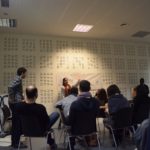07/02/2017
The second day of the event started after breakfast, provided by the kind nuns at Adele Picot. The first task for the participants was simple: get to know each other!
After the first activity the facilitators, Mauro and Rita, engaged the participants to share their expectations of the Stakeholders Forum. They were also asked to share what they thought were their own contribution to this event.
Following this everyone was given a large paper and pens, and instructed to write and draw a presentation of their organisation’s projects on it.
Then we taped the presentation on the participants and they did an exercise called “sandwich”, meaning that they walked around the room and when a facilitator rang the bell, they joined in couples and could present the project to each other using the large paper.
In the afternoon, the participants were divided into groups and each group received a question regarding volunteering and heritage.

There were five questions and after the groups had discussed one of the members presented their conclusions and showed the flip chart they had created. This provided an opportunity for the other groups to come with suggestions or viewpoints and led to many interesting discussions within the whole group. The questions and the groups’ answers are presented below.
How to manage Volunteers?
- minimum quality standards
- logistics
- recognise individuals as well as their individual expectations
- manage these expectations
- intercultural understanding and cooperation
- ensure the volunteers made some significance or impact
- encourage democratic decision making
- allow opportunities for self development
- information and training
- evaluation with volunteers
- mentorship, prepare and take care of volunteers mentality
- socialise with them and the society
- push them to go beyond their limits (nice pressure)
- empathy
- “de- school” them
- open up to the volunteers
- make friendships
- researcher for those who dont have experience on heritage
- share experiences
What heritage means to you?
- a way of life
- traditions, custom norms of a community
- carried from one generations to the next
- precious
- generational treasure
- natural and cultural landscape
- pride and identity
- values
- dynamic to some, not to others (depends on context)
- something which is created and transformed
- intangible and tangible
- history and knowledge
- reflection as a reference point
- mutual tolerance
- political
- economical (tourism etc)
- difficult for CSR projects to donate to, since it can be abstract (intangible)
How to work with volunteers on a heritage site?
- identify the motivations and expectations of volunteers
- develop skills
- create a certification
- create a comfortable environment
- to make volunteers feel proud at the end
- community life rules and safety standards
- each volunteer can bring their own experience and positive knowledge
- important that they feel involved
- prepare in advance for the country which they are going, the activities, the customs (both in home and host country)
- explain why it is an heritage site and how it is related to the work
- explain the impact of their work and make them understand the value of tangible and intangible heritage
How to promote volunteering projects on cultural heritage field?
- videos, workshops
- social media
- photos help to engage people, provoke emotions
- tv radio
- visibility – open days
- public actions, demonstrations, exhibitions
- universities – the formal education system
- local communities and governments
- slogan and punchlines can motivate people
- guerrilla actions – stickers in the street for ex. “hugging the buildings”
- education activities for young people to create attachment to some heritage site
- better measure and manage the impact of what we do
- testimony and personal stories that can attract others are essential and very important
What it means to be a volunteer?
- you have to invest resources, yours or others
- you provide good things
- you give and you get, for personal and professional development and satisfaction
- to spare some of your time for your beliefs
- what you get is for your personal development
- the social part is interactive, you make friends
- you change and create positive impact on peoples lives
- you can commit yourself and “marry your goals”
- to break sensitives issues in a non violent way
- sometimes you can be overwhelmed of what you do
- you have fun
- to challenge yourself and to accept challenges
- to share my experience with others
- to do good things
- to be curious of other cultures
- to provide service
- interactions with others makes you learn from diversity, other people and cultures.









Leave a Reply
You must be logged in to post a comment.